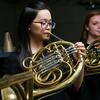Bachelor of Music in Performance
Develop the skills to perform professionally with the Bachelor of Music (BM) in Performance in Temple’s Boyer College of Music and Dance. You’ll choose from a range of concentrations. This 124-credit, full-time bachelor’s degree prepares you with intensive coaching and training by faculty from well-known institutions such as Opera Philadelphia, Pennsylvania Ballet and The Philadelphia Orchestra.
The liberal arts curriculum in the Bachelor of Music in Performance program emphasizes both solo and ensemble performance through hands-on instruction, providing pathways for careers in all facets of musical performance.
In addition to eight semesters of private lessons and ensemble performances, students complete coursework in aural theory, music history and theory, and other courses that vary by concentration. Courses also focus on specific business aspects of the field to prepare you for the professional world.
As part of the Center for Performing and Cinematic Arts, Performance BM students have opportunities to participate in ensembles and productions at the Temple Performing Arts Center, in addition to the Kimmel Center for the Performing Arts in Philadelphia and the iconic Lincoln Center for the Performing Arts in New York City.
You can also explore information about the Bachelor of Music in Jazz Studies Performance.


